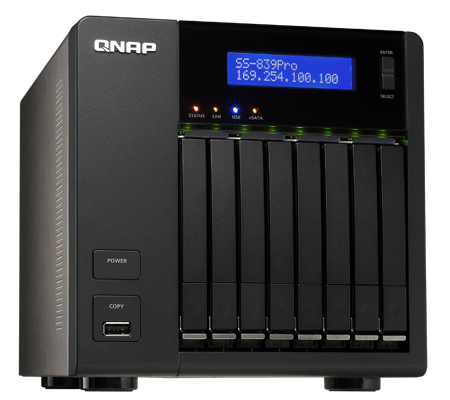QNAP's acquired a taste for Intel Atom-powered NAS units, and the Taiwanese manufacturer is today following up its four-bay SS-439 with the launch of the larger eight-bay SS-839 Pro Turbo.
The unit, pictured below, offers eight 2.5in drive bays, supporting a maximum total storage capacity of 4TB. Why bother with a 2.5in solution? Well, it saves space - with the SS-839 Pro Turbo measuring 177mm x 180mm x 235mm - and it should save power, too.
QNAP reckons that the Atom-powered unit will consume in the region of 34W with eight 2.5in drives installed - that's around 60 per cent less than an equivalent eight-bay 3.5in unit, it adds.

Inside the SS-839 Pro Turbo resides a 1.6GHz Intel Atom N270 processor and 2GB of DDR2 memory. The device supports RAID 0/1/5/6/5+hot spare and JBOD configurations, and features two eSATA ports for storage expansion.
As you'd expect, it's armed with a large array of software features - including built-in iSCSI support for up to eight targets, AES 256-bit volume-based encryption and scheduled power on and power off.
QNAP hasn't yet detailed pricing, but the SS-839's complete specification can be found over at the official product page.













